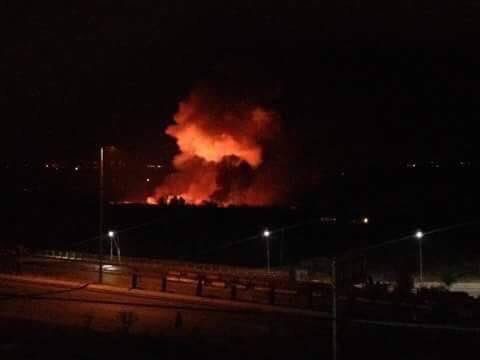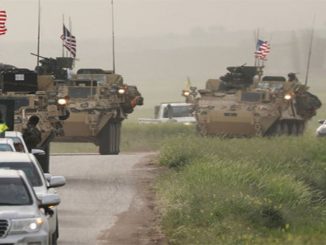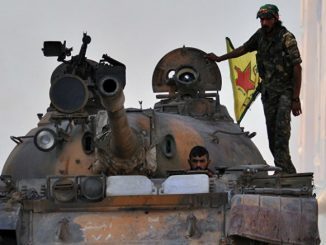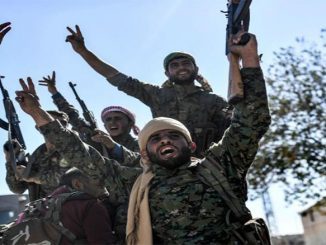
After Israel’s attack on Mazzeh military airport yesterday, some sources said it targeted Hezbollah ammunition and Russia allowed it to weaken Iran’s influence in Syria.
Syrian state television quoted the army as saying several rockets were fired from an area near Lake Tiberias in northern Israel just after midnight which landed in Mezzeh military airport, a major facility for elite Republican Guards. The strike reportedly damaged one of the compounds of the crucial military facility.
“Syrian army command and armed forces warn Israel of the repercussions of the flagrant attack and stresses its continued fight against (this) terrorism and amputate the arms of the perpetrators,” the army command said in a statement.
There was no information on the death toll resulting from the airstrike immediately available.
Earlier, state television said several major explosions hit Mezzah military airport compound near Damascus and ambulances were rushed to the area, without giving details.
Footage from the scene with heavy fire and the sounds of explosions has surfaced on social media. Multiple reports from journalists and activists on the ground described the bombing, with the opposition also reporting there were rockets fired.
The Mezzeh airport is located west of Damascus, just 5 kilometers from the Presidential Palace, the official residence of Bashar al-Assad.
This is the second time in two months the Israeli Defense Force (IDF) has being accused by the Syrian government of targeting Syrian positions from Israeli territory.
In addition, Israel in the past has targeted positions of Lebanon’s powerful Hezbollah group inside Syria where the Iranian-backed group is heavily involved in fighting alongside the Syrian army.
Israeli defense officials have voiced concern that Hezbollah’s experience in the Syrian civil war, where it has played a significant role and recently helped the Syrian army regain the eastern sector of the city of Aleppo, has strengthened it.
Some sources said that this attack may have targeted Hezbollah ammunition stored in Mazzeh airport.
Russia and Iran contradicting interests
Russia and Iran found a natural ally in Bashar al-Assad and his regime, and together they made an alliance to save its rule and accomplish their own agenda in the area.
However, this alliance seems to be fragile and shaky, as the two powers have different views of Syria’s future.
Russian president Vladimir Putin then said that both the opposition and Asad regime have signed a number of documents including a ceasefire agreement between the Syrian government and the opposition, measures to monitor the ceasefire deal and a statement on the readiness to start peace talks to settle the Syrian crisis.
However, this agreement didn’t end Assad regime’s attacks on the rebel-held areas. The ceasefire were breached in Aleppo, Hama, Idlib and most notably in Damascus.
The Iranian-backed militias show clearly Iran’s intention to undermine the ceasefire and the upcoming peace talks, as they don’t serve its goals for the region.
Russia needs Syria as a strong country that serves as an ally in the future. Russia wanted to use the peace talks to end in a political solution that ends the Syrian crisis and stops the war and military operations, as the more this war lasts the more Syria will be destroyed and harder to be rebuilt again.
On the contrary, Iran refuses any reconciliation between the government and the rebels. Iran wants the war to last until all the opposition forces are annihilated not caring for the destruction and lost lives. Iran needs Syria as a weak and destroyed land which will be easier to control and easier to be shaped in the future in the way that serves Iran’s goals.
Therefore, Russia sought in the past weeks to weaken Iran’s influence in Syria, to ba able to find a solution for the Syrian crisis and weakening Iran’s militias in Syria may be one of Russia’s moves.
Russian air defense and Israel’s attack
Russia has deployed last year S-400 and S-300 air-defense systems to Syria to protect its troops stationed at the Tartus naval supply base and the Khmeimim airbase and block any attack against Assad regime. The radius of the weapons reach may be “a surprise” to all unidentified flying objects, Russian Defense Ministry spokesperson General Igor Konashenkov said.
According to the Russian Defense Ministry, any air strike or missile hitting targets in territory controlled by the Syrian government would be blocked.
However, Israel’s latest attacks weren’t blocked by these systems. Russia has previously coordinated with Israel over its campaign in Syria and shared information about each other’s aerial sorties.
Russia may have known about Israel’s attacks and even coordinated with Israel to make them possible without blocking them, to destroy part Hezbollah’s strength in Syria and weaken its firepower, in order to weaken Iran’s influence.
The last attack may be also a warning to the Iran-backed militias interfering with Russia’s interests in Syria.
The Syrian crisis began as a peaceful demonstration against the injustice in Syria. Assad regime used to fire power and violence against the civilians and led to armed resistance. 450.000 Syrians lost their lives in the past five years according to UN estimates, and more than 12 million have lost their homes.



